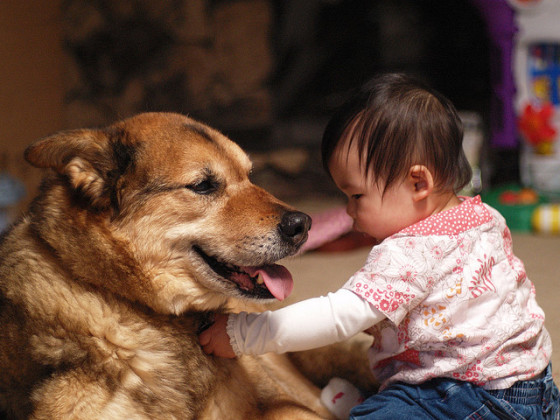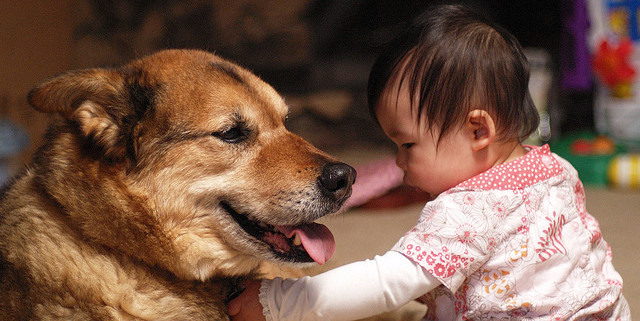Best Dogs For Babies

Contents
Dogs That Get Along With Children
There’s a lot of conflicting evidence about whether certain breeds and types of dogs are naturally good-natured or naturally vicious. For example, some states and cities have banned ownership of pit bull-type dogs because of their reputation for viciousness. On the flip side, we think of golden retrievers as unfailingly friendly and even-tempered. Certain types of dogs, including pit bull types, Rottweilers, and German Shepherds, do account for more bites than other types. However, any type of dog can be dangerous – even family dogs with no history of problems.
So, when choosing a dog with a family in mind, what should you consider?
First, as mentioned above, there are certain breeds that seem more likely to bite than others. That said, those same breeds are typically considered to be highly intelligent and trainable, meaning they can be as safe as any other type of dog with proper care and treatment. You may want to consider your experience with raising and training dogs before committing to a breed that may be more likely to bite.
Second, consider how much time and space you have to devote to your dog. That can inform your choice of breed as well. Some breeds need a lot of open space to run around in while others are suited to apartment life. Some have a lot of energy and will need plenty of attention to stay healthy and happy while others are more relaxed and require less care. Certain breeds are prone to health problems, which can be expensive and time consuming. Purebred dogs in general tend to be more likely to suffer from health problems than mutts.
Third, you should consider whether to adopt a puppy or an older dog. If you adopt a puppy, you can train it from a young age to behave safely. However, a puppy takes a lot of time and attention – and you may not have much to spare if you’re also raising a baby! Neglecting a puppy can make it prone to lash out, putting your family at risk. If you adopt an older dog, you’ll have to deal with whatever training it received (or didn’t) from its previous owners. Older dogs may be more mellow and require less attention than puppies, making it easier to balance caring for your child and your pet.
Finally, consider how your family will affect the dog. Certain dog breeds may be more suitable for families due to their patient temperaments, high energy, and affectionate natures – bulldogs, collies, Irish setters, labrador retrievers, and golden retrievers have reputations as good family dogs who can handle what small children throw at them. Other breeds may be more nervous and get stressed out by a toddler’s roughhousing – toy poodles and other very small breeds are particularly skittish.
Dog And Baby Safety
As mentioned above, any dog can be unsafe without proper training and care. Once you’ve chosen the right dog for your family, how can you keep both your dog and your little one safe?
Training Your Dog
Proper training is crucial. If you don’t have experience training dogs, consider investing in a few lessons with a dog trainer to get the basics down. Your dog needs to know that you’re the boss and that certain behaviors are never tolerated – that means you have to be extremely consistent in your training regimen. Training will include basic commands such as sitting and staying, but it will also involve more general behavioral concerns. For example, you’ll need to teach your dog how to behave around other dogs and strangers.
Dogs are most dangerous when they’re not getting the care they need. That may mean they’re not eating enough, they’re not getting enough attention, or they’re feeling sick, injured, or threatened. You’ll need to take good care of your dog to avoid the kind of psychological stress and damage that leads dogs to attack. That’s part of being a responsible pet owner whether you have children or not.
Training Your Baby
No matter how well-trained and good-natured the dog, you should never leave the dog and the baby alone together. It just isn’t safe. Even a happy family dog can bite if it’s startled by the baby crying or flailing around. Once your little one is old enough to start moving around, it’s time to start teaching dog safety. Your little one will need to learn to be gentle and careful with your dog to avoid accidentally injuring the dog – no riding, pulling on the ears or tail, or picking up the dog. You’ll need to teach your child to stay away from the dog’s food and bed and not to bother the dog while it’s sleeping or eating; these are safe times and spaces for the dog. You’ll also need to teach your child never to hit, yell at, or do anything else to the dog that may startle it.
Whether you have a dog in your home or not, you should also teach your child about dog safety in general. Children should never approach or touch other people’s dogs without the owner’s consent and supervision, even if the dog is familiar. Talk to your child about how to react if a dog becomes aggressive. That means standing still and quiet, not escalating by yelling or trying to hit the dog, and curling into a ball and covering your head if the dog attacks.
If your child is ever bitten by a dog, you should seek medical attention immediately. Dog bites can carry serious infections that require prompt treatment, and the infections can be transmitted even by minor bites. If your dog bites your child, you should seek the advice of a professional dog trainer on how best to handle the situation. In severe cases, it may be safest to give up your dog. In addition, consider that you may be entitled to compensation for the injury; you may wish to speak to an attorney about your rights.
Babies And Dogs
Your child is growing and experimenting and your dog can be an important part of your child’s life. Dogs can be great protectors and companions for children. The trick is introducing your dog and your child in a safe way and in a safe environment. Remember to keep safety at the front of your mind when choosing a dog and when teaching your little one how to interact with the dog. With the right care, your baby and your dog can be the best (and cutest) of friends.
Image Credit and License








Leave a Reply
Want to join the discussion?Feel free to contribute!